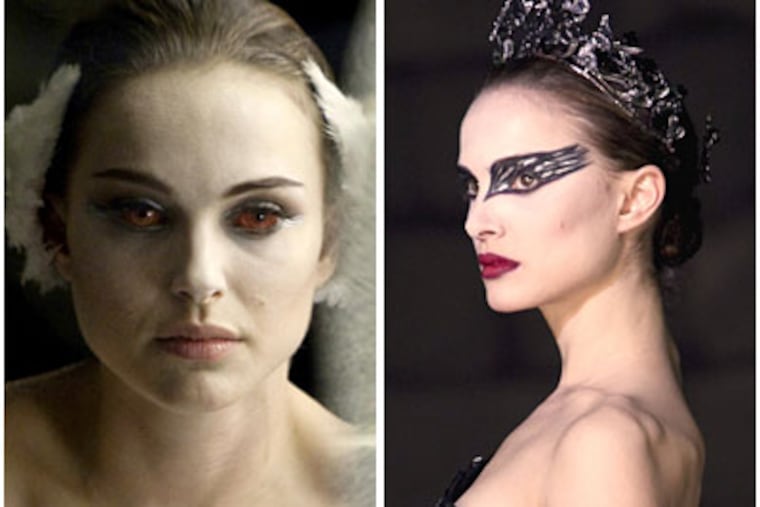Natalie Portman’s mad ballerina in 'Black Swan' is tutu much
IN "THE WRESTLER," Mickey Rourke rakes his body with staples, glass fragments, razors and barbed wire.

IN "THE WRESTLER," Mickey Rourke rakes his body with staples, glass fragments, razors and barbed wire.
But is he tough enough to be a ballerina?
Probably not, judging by the marathon of masochism that is "Black Swan," featuring Natalie Portman as a dancer who threatens to drown in a production of "Swan Lake."
Both movies are the work of director Darren Aronofsky, cinema's leading authority on self-mutilation, if not suffering in general (now that Mel Gibson's in early retirement).
And while the styles of his last two movies vary greatly - "The Wrestler" is a work of docudrama realism, "Black Swan" is a stylized nightmare - they offer similar, bloody portraits of a performer willing to make any sacrifice for the sake of his/her art.
Portman plays Nina, a dancer driven to abuse her body by a compulsive perfectionism and a mother (Barbara Hershey) transferring her own frustrated ambitions as a dancer.
Wait . . . a stage mom? Oh, yes, Aronofsky fears no dance-movie convention. He embraces them - the bitchy backstage catfights (it's like revisiting "Burlesque"), the manipulative director, the jealous prima ballerina (Winona Ryder!), the conniving upstart rival (Mila Kunis).
It's all there, all colorfully delivered by a game cast. Vincent Cassel, fresh from his amazing turn in "Mesrine," is company director/Svengali who thinks nothing of accosting the minds and bodies of his dancers.
He chooses virginal, technically flawless Nina for her inherent white swan qualities, then brutally coaxes from her the animal instincts and carnal attributes of the black swan.
This means goading Nina with an ambitious understudy (Kunis) who's her personal/professional opposite - a sloppy dancer, but not nearly as squeamish about sex.
Throw in Nina's life with mommy dearest in a claustrophobic apartment, and it's enough to drive a girl mad. And mad she is driven - the second half of the movie is set partly in reality, partly in Nina's stress-fueled imagination.
And that's where Aronofsky wants us, in an off-balance limbo of horror-movie hysteria, caught between deranged fantasy and hyperreality.
Portman has been winning raves for her sweaty distress as poor, unraveling Nina, and there's Oscar talk - the kind that follows women who engage in Nina-like "sacrifice." Portman trained like a maniac and lost 20 pounds, and she weighed 40 to begin with.
Her Nina is the latest in an Aronofsky parade of doomed or dying or degraded women. Jennifer Connelly in "Requiem for a Dream," Rachel Weisz in "The Fountain," Marisa Tomei in "The Wrestler," now this.
Portman's takes the cake, raking her skin, ripping out her own finger- and toenails, etc. There's never a dull moment.
Case in point: a very physical love scene between Kunis and Portman, which I'm happy to report is not gratuitous, and therefore can be enjoyed on artistic merit, no trench coat required.
Still, the interlude ends cruelly for Nina, and for my money, she is too much, too often the victim in this nutty story. Randy "The Ram" Robinson put his life on the line for his craft, but there was something heroic and ultimately touching in it.
In Nina, it is much easier to locate the masochism than the heroism. There's something missing. Could she have risen to the top of her profession without the toughness, mettle and confidence that comes from a life of discipline and work?
Whatever it is, you can find it in other, more moving portraits of pain and perseverance - Jennifer Lawrence in "Winter's Bone" and little Hailie Steinfeld in the upcoming "True Grit."